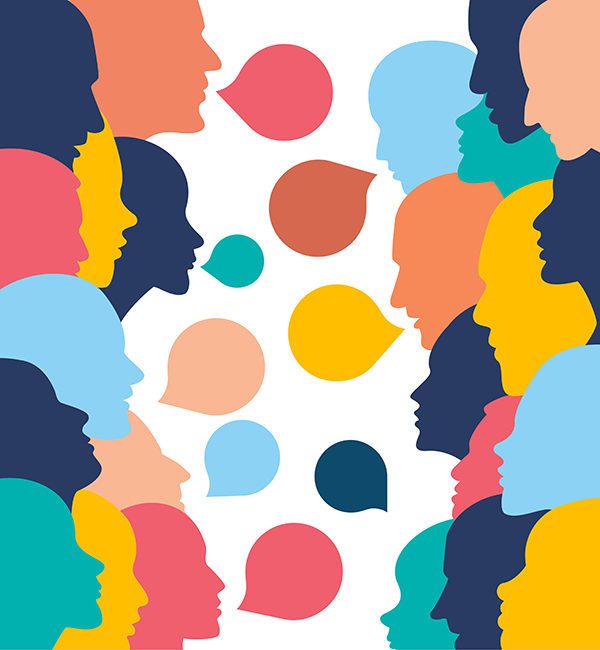By Atena Danner, Associate Director of Learning and Facilitation, Erikson Institute
“The revolution will be accessible or it’s no revolution at all.” — Mia Mingus
Accessibility is defined by Sins Invalid* as the ways needs are addressed for someone to fully participate in a space or activity. Access is an essential value for any justice-seeking group to engage with. The ability of participants to understand what is being said and the ideas being presented are particularly necessary elements of spaces where learning happens. As an anti-racist team, Erikson’s Policy and Leadership Department is committed to developing our capacity to create spaces where participants can join in, express their ideas authentically and safely express curiosity in the pursuit of learning. We are also committed to being honest about where we are in that journey.
As we continue to analyze how language is used to oppress and dehumanize, our collective understanding is expanding to include the pitfalls and impacts of unintentional exclusion, so we can get better at practicing what we preach. Right now, we are using the tools we have available and taking note of what others are doing to make learning experiences more accessible. This includes strategies such as live captioning, recordings, and making materials available in advance. We’ve also applied interactive visual tools like Menti and Jamboard to help people participate more fully according to their learning and thinking styles. We have a lot to learn; we are putting what we know into action.
The Policy and Leadership team is always looking for ways to make our workshop content accessible to whomever wants to use it to make an impact. Recently, we were eager to arrange for translation and interpretation for our Decolonizing Data and Language workshop which explains how deficit language dehumanizes and deflects from the structural racism and other flaws in our systems. Many people have shown interest in learning about ways to effectively use data to illuminate systemic barriers and we thought it would be a great idea to translate the workshop, planning to offer Spanish language interpretation and materials. We were also hoping to arrange American Sign Language interpretation in future sessions to further expand opportunities for participation.
Our team is in ongoing conversation about living the values we talk about in our learning sessions. We thought about it more and realized that translation would not be so simple. Further discussion about what it would mean to present this workshop in different languages led us to conclude that it would be best to pause plans to have our session translated in real time. It takes time and mindfulness to produce a workshop relevant to people speaking other languages. The language aspect of the workshop is grounded in the nuances of the English language which may or may not translate to Spanish. While the implications of harmfully labeling people are present irrespective of language, the labeling we are critiquing is English-specific. We cannot take clarity for granted as we express ideas from one language to another. We would need to identify labels in the Spanish language that could be problematic, and we haven’t done that work yet. Interpreting the workshop and translating all the documents without more time and intention would not expand access in the way we want – it could possibly create confusion and/or frustration for the audience because we don’t have concrete examples like what we offer in our Decolonizing Data and Language “Cheat Sheet” resource. To do this right, we have to resist the white supremacist impulse to urgently address the issue before we understand the context.
Anyone who has learned more than one language has encountered moments where there was no direct translation of a word or idea. Not all meanings have analogues in every tongue, every culture, or every land. Understanding each other across languages takes work and time. We cannot rely on google-translate style interpretation to relay the cultural contexts that our understandings are rooted in.
Accessibility as a value intersects powerfully with anti-racist work. The word “decolonize” becomes particularly significant here because it highlights the nature of our problem: Languages have their own histories and needs for understanding. Different languages have been colonized in different ways; decolonizing is not one-size-fits-all.
The Policy and Leadership team’s efforts are oriented toward identifying practices rooted in white supremacy and uprooting them from the ways we work and relate to one another. We look for opportunities to restore practices that have been supplanted by white supremacist ideals and reclaim the kinds of relationship building, problem-solving, and imagination that oppressive systems would discourage us from. The English language is a prime example of how culture and communication can be colonized. As English speakers, our words and ways of speaking are a confusing mélange, a patchwork of words gathered by imperialist and colonial forces and held in place by the tongues of people who were held in places where English forced its way in. Whatever languages we operate in, it is important that we communicate these ideas with great care. As speakers who facilitate in a socially- and economically-dominant language, we need to seek engagement with collaborators to share in other languages with respect, humility, and curiosity. We know that at this moment we are not ready. But we will be.
*Sins Invalid is a disability justice-based performance project that offers political education as a means of integrating analysis and action around disability, race, gender, and sexuality

Join the Erikson family with monthly news + events updates shared by academics, community members, and families.
Listen to our podcast